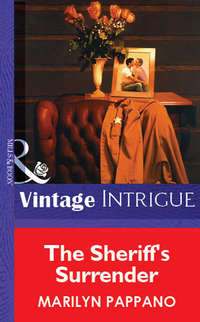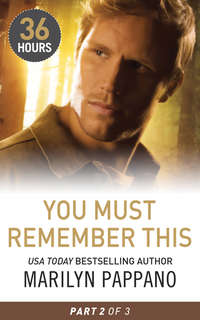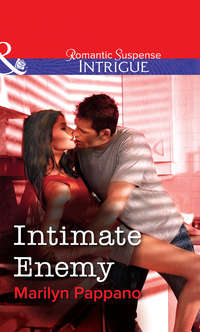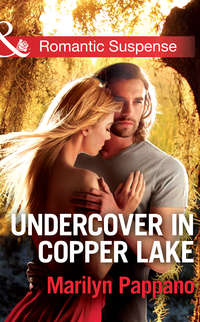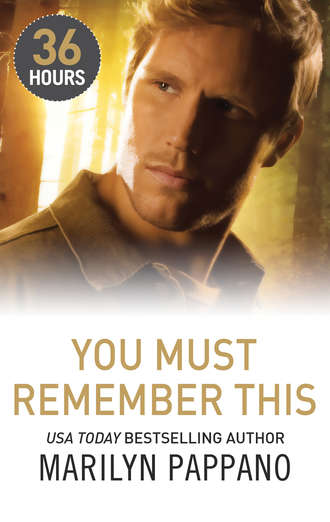
Полная версия
You Must Remember This
This afternoon he stared, cataloging features that he knew by heart and yet didn’t know at all. Blond hair in need of a trim, blue eyes, crooked nose. High cheekbones, thin lips, square jaw.
His gaze slid lower. There was a scar on his upper right chest—round, raised, the edges uneven. A gunshot wound, Dr. Howell had said. The long, straight, clean scar underneath it was from the incision made to remove the bullet. There were a matching set on his back and other smaller scars on his chest and back, plus one on his arm from something jagged—maybe a broken bottle or a dull knife that had torn instead of cut.
God help him, what kind of person had he been?
Violent.
Criminal.
Dangerous.
Had he been a dangerous man? He didn’t want to believe it, but sometimes he did. Sometimes he dreamed that he had been exactly the sort of person who could threaten, intimidate and hurt—maybe kill—someone else. Sometimes the dreams were so vivid, so intense, that they terrified him, and he spent the rest of the night pacing the room to avoid falling asleep again.
That was the first thing he had to tell Juliet Crandall this evening. She hadn’t wanted to help him in the first place. Warning her what kind of man he might be was only fair.
He’d never felt compelled to warn Terry Sanchez. But he had never seen Terry outside the library, and all he’d wanted was her assistance. He wanted a lot more from Juliet.
A hell of a lot more. But he couldn’t have it. He might have a wife and kids somewhere. There might be warrants for his arrest. Whoever had tried to kill him before might try again. Before he could have any kind of future, he had to find out about his past. He had to find out whether he deserved a future or whether everyone would have been better off if one of those bullets had killed him.
Maybe, once he knew the truth, then he could want someone. Maybe then he could have someone.
Scowling, he turned the shower to hot and stepped into the tub. It wasn’t yet four o’clock. He would be ready to go to Juliet’s house three hours early. Or maybe he would never be ready to go to Juliet’s house.
He bathed quickly, grateful when he got out that the mirror had fogged over. He dressed, combed his hair straight back, then stretched out on the couch to watch the clock. He didn’t turn on the television in the corner or pick up the morning paper his landlady had brought over when she’d finished with it. He just lay there, wishing, wondering, regretting.
The minutes crawled, but finally the bedside clock read six-forty-five. He left the apartment, slipped through the gate in the back fence and made his way to the block where Juliet lived. Her car, a sensible gray sedan, was parked in the driveway, and the front door was open. He raised his hand to knock on the screen door, then stilled.
He could see a corner of the living room, an equal wedge of another room and down the wide hall to the kitchen. As he watched, Juliet turned the corner at the far end and started toward him. She was wearing a dress, a garden-party sort of dress of soft, flowing fabric, subdued flowers, ribbon trim and a row of little white buttons that ran from the modest V-neck all the way to the ankle. They were already fastened from the waist down, as if she had simply undone enough buttons to step inside the garment, and she was buttoning the rest now, her steps slow and leisurely, her head bent.
Maybe he stifled a groan or a board creaked or his skin was sizzling from the sudden influx of heat. Whatever the cause, abruptly she raised her head and stared at him through the screen. He felt dim-witted, thick-tongued and embarrassed, as if he’d been caught spying. He wanted to turn and walk away, to pretend that he’d seen nothing. Truth was, he hadn’t seen anything. Just a narrow strip of pale skin that dipped between her breasts to her waist. Just her fingers working the small buttons. Just enough to know that he wanted more.
She turned her back. When she faced him again, the last button was securely fastened and her face was tinged pink. She held the screen door open a few inches. “Hello.”
He took hold of the handle, but didn’t pull, didn’t step inside. Instead, in a masterpiece of clumsiness, he blurted out, “Before we start, I think you should know that someone tried to kill me.”
“Today?”
“No. Several years ago.” When she looked puzzled, he explained, “I don’t know who I am—who I used to be—but apparently it was someone with enemies. Someone who did something worth killing over.”
For a long time, she simply looked at him. Then abruptly she shrugged, making her hair sway. “Or maybe you were the victim of some crazy with a gun. Lord knows, there are enough of them around. Come on in.”
He went inside, then flipped the hook on the jamb into the eye on the door. By the time he turned, she was already in the room on the right.
It had once been a formal dining room and still held dining room furniture. The pieces were old and oak—an oval table big enough to seat six, four chairs that matched, two office chairs on wheels and a china cabinet. The oak was heirloom quality, suited to a country house with a family to fill the chairs. Here it did duty as a desk, supporting her computer and printer. The shelves of the china hutch held books, flash-drives and printer cartridges. Packages of paper were visible in the cabinet underneath before she shoved the door shut as she passed.
She sat in a bright blue chair in front of the computer but made no effort to turn it on. We’ll talk, she had said, and that was apparently all she intended to do. Doing it here, he assumed, instead of the living room where they would have been more comfortable was her way of keeping it strictly business.
“I’ve been thinking about this all afternoon, and I’m not really sure I can help you.”
He didn’t want to hear that, pretended he didn’t hear it as he circled the room. There were blinds on the windows, no curtains and nothing on the walls but a corkboard directly behind her. From across the room, he couldn’t make out any of the notes thumbtacked to the board. When he pulled out the chair beside her, he still couldn’t read them. Her writing was atrocious.
“Exactly what was Terry doing?”
“We went through old newspapers and school yearbooks, checked town records, looking for something I might remember.”
“You think you’re from here.”
“I know I’ve been here. From the start, I’ve had this feeling…” He wasn’t one to talk much about feelings, or if he did, he disguised them with other words. Instincts. Intuition. Intuition told him he’d been in Grand Springs long enough to gain a familiarity with the place. Too often he knew what was around a corner he’d never turned. He’d known in September about the eighty-foot-tall pine that would be decorated for Christmas in December. There were places—the high school gymnasium, a restaurant downtown, a clothing store—where he knew he’d been at some time in the forgotten past.
“But if you had lived here or spent any length of time here, don’t you think someone would recognize you?”
He scowled at the logic of her argument. “Maybe it was a long time ago. Maybe I’ve changed. Maybe I’m not that noticeable.”
Juliet had to bite her tongue to stop from snorting scornfully at that last comment. Not noticeable? In what galaxy? She’d seen his effect on the females in the library, from giggly teenagers to white-haired grandmothers. There was no way he could have spent any time here and the women of Grand Springs not notice him. “When you appeared in Grand Springs, you didn’t remember anything?”
“I remembered who was president of the United States. I knew that I’ve always liked Italian food. I knew I spoke fluent Spanish. I remembered plenty of things. Just nothing important, like who I am or where I’m from.” He slumped in the chair, his feet stretched out so that they nearly touched hers. She swiveled her chair a few inches to the right.
“What happened the night of the accident?” She knew there’d been a wreck, that he’d suffered a head injury and now had amnesia, but the rumor mill was short on details, and details were desperately needed if she was going to help him.
“The first thing I remember is waking up with a hell of a headache. I guess I lost control of the car in the storm and hit the guardrail.”
The storm. That was how the town referred to that weekend last June. Rains had saturated the area, and the downpour that Friday evening had been more than the ground could bear. There had been massive mud slides, closing the highways and causing a blackout that lasted into Sunday.
“Besides banging your head, were you hurt?”
He shook his head. “I left the car and started walking. The town was completely dark, so when I saw lights, I headed for them. It was the hospital. They examined me, gave me a name—”
“After the soap opera hunk,” she said, and he scowled again. Which offended him more—the soap opera part or the hunk part?
“And called the police. They were busy with the blackout and the mayor’s murder, but eventually they got around to me. They took my fingerprints and sent them to the FBI and the state. They didn’t know who I was, either.”
“So we know you’re not a cop, you were never in the military, and you’re not a crook.”
“At least, not one who’s been caught.”
She ignored his mutterings and went on. “Before the accident, were you coming to Grand Springs or going away from it?”
“I don’t remember.”
“Which direction was your car facing when you regained consciousness?”
“I don’t remember. I’d hit my head. I was disoriented.”
“What happened to the car?”
He lifted his shoulders in a shrug. “Once things settled down and the roads were reopened, Stone Richardson took me out to find it. We couldn’t.”
“Why not?”
“I didn’t remember where I left it, but wherever that was, it was no longer there. We drove all the way to the interstate and found nothing.”
“So someone stole it.”
“Or it got swept away by the mud slides.”
“Is that possible?”
His look was dry, his voice even drier. “Have you ever seen a few tons of mud and rock come rushing down a mountainside?”
“I’m from Dallas. We don’t have mountainsides. We don’t even have many hillsides.”
“A mud slide can uproot trees, tear down guardrails and destroy chunks of roadway. It can move a building off its foundation and carry it away, breaking it into splinters along the way. It can destroy a town, kill anyone in its way, and, yes, it can wash away a car.”
“Didn’t anyone search for the car?” It seemed a simple enough task to her: find the places where the mud had rushed over the highway, follow it down the mountainside and find the car. If it wasn’t immediately visible, search any places where the mud was deep enough to cover it. Easy.
“When you moved here, you drove into town from the interstate, didn’t you? You saw the drop-offs in some places along the highway, didn’t you?”
She nodded. In a few places, the shoulder wasn’t more than a few feet wide, and nothing more than a steel guardrail separated a car on the highway from a two-thousand-foot fall. Other drops were less dramatic, but there were plenty where a search would be difficult at best. “Do you think your car went over one of those drop-offs?”
“I don’t know.”
“So Stone took your fingerprints and checked missing persons reports and got nothing. Has he done that recently?”
“Why would he?”
“Maybe, when he checked, your family or friends or employer hadn’t yet realized that you were missing. Maybe you were on vacation and not expected back for several weeks. Maybe they filed a report a few days or weeks later.” Picking up a pen, she made a note on the pad next to the computer. Tomorrow she would be at the police department. She would talk to Stone about trying again. “Do you have any scars, tattoos or distinguishing marks?”
He mumbled his answer as if he preferred not to acknowledge their existence. “Scars.”
Her gaze followed his right hand to his left arm, where he rubbed the thickened skin. She made a note of its location and length even as she wondered what he had done to earn such an injury.
“It’s a defensive wound.”
Given a little time, she could have figured that out. The scar ran four inches along the inside of his arm, as if he had raised his arm to ward off an attacker. But who had attacked him and why? Had he been an innocent victim or an equally guilty transgressor?
She would like to believe “innocent victim,” but it was hard to cast him as either innocent or a victim. On the other hand, it was easy to see him as aggressive, strong, take-charge, bold. It was easy to imagine him meeting an attacker head-on, giving as good as he got.
Unless his attacker was someone he couldn’t defend himself against—a woman, perhaps, a friend or an authority figure. Or unless he believed he deserved the attack. Which brought her back to her original question: what had he done?
Knowing that he could offer no more information than her wild imagination, she pressed on. “You said scars. What about the others?”
“What does it matter?”
“The more identifying information we can provide, the better the chances of getting a match.”
“Assuming that there was someone who cared enough to file a missing persons report.”
“You don’t think there was?”
His fingers knotted, and his eyes turned the bleak blue of a sunless wintry day. “I don’t know.”
Under the best of circumstances, it was a vaguely dissatisfying answer. When it applied to every area of your own life, when it answered even the simplest, most basic questions—What is your name? How old are you? Where do you live?—it must be frustrating as hell.
“You weren’t wearing a wedding ring?”
“No. No tan line, either.”
“Which proves nothing. There has to be someone—a wife, a girlfriend, friends, neighbors, co-workers. You can’t have lived so isolated that no one’s noticed you’re gone.”
“I don’t know.” Rising from his chair, he paced to the other side of the table. He was restless, edgy, and he made her feel edgy. She fiddled with her pen as she watched him.
“What about the other scars?”
For a long moment, he looked at her, then answered in a rush. “I’ve been shot twice—once in the back, left side, down low, and once in the chest, upper right side. There are two entry wounds, plus two surgical scars where the bullets were removed. Based on the way scars mature, the doctor says one is a couple of years old, the other probably a couple of years older than that.”
“And the scar on your arm?”
“It’s older. I’ve had it since I was a kid.”
“The doctor told you that?”
“No. I just know….” Frustrated, he gestured toward the computer. “What can you do with that?”
She could do anything, go anywhere, be anyone. His interest, of course, was much narrower. What could she do for him? It was her turn to parrot his answer. “I don’t know. I need a name, a town, something to go on.”
“If I had a town, I’d be there, and if I had a name, I wouldn’t need—”
You. She smiled faintly. She knew that, of course. If she didn’t have something tangible to offer, he would have no interest in her. Too bad that she had nothing to offer—just lots of questions and no answers. “You said you’ve had this feeling of familiarity about the town. What about the people?”
He shook his head.
“No one seems familiar? No one brings a particular response?”
He stood at the window, back straight, very still, and stared out. The sun’s last rays shining through the partially opened blinds cast a pattern across his face, with a shadow across his mouth and another over his eyes. At last, he answered, his voice so grim that she didn’t want to see his eyes. “Olivia Stuart.”
Juliet drew her feet onto her chair seat and wrapped her arms around her knees to contain a shiver. For such a short time in town, she’d learned a lot. Olivia Stuart had been widely admired in Grand Springs, hailed as the town’s best mayor ever. Her death last June, presumably from a heart attack, had stunned everyone. The news that the heart attack had been drug-induced had sent shock waves through the town. Last October the police had arrested one of her murderers—a professional killer by the name of Joanna Jackson—and were still looking for another of those involved, Dean Springer. Springer had hired Joanna, but to this day, no one knew whom he was working for. No one knew why his mysterious boss had wanted Olivia Stuart dead.
Maybe Martin Smith knew.
As if he knew the direction her thoughts were traveling, he smiled mockingly. “I was questioned and cleared. At the time the mayor was given the fatal injection, I was somewhere out on the highway. A couple of Grand Springs’s respectable citizens can vouch for that.”
But that only meant that he hadn’t been the one to actually give the injection. Could he be the one who had ordered it? Could he have held a grudge against the mayor with lethal consequences? Juliet didn’t ask the questions aloud, but Martin had already asked them and failed to come up with answers.
“Could you have known Olivia?”
“Maybe.”
“Could you be a relative?”
“No.”
“How can you be so sure?”
“She had a son and a daughter. I’ve met both of them, and they don’t have a clue who I might be.”
It shouldn’t take you long to hit a dead end, he’d said this afternoon, and he had been right. She was running out of questions, and they had learned nothing. “What kind of response does she bring?”
He shrugged but continued to stare out. “That night in the ER, I heard that she’d had a heart attack, and…I was sorry. I didn’t have any idea who she was, but…it mattered. It was as if her death—or her life—was important to me in some way.”
“Maybe you’d done business with her. Maybe you were on your way here to meet with her.”
“Stone checked her appointment book. Everyone listed in it is present and accounted for.”
“Maybe your business with her was personal.”
He shook his head. “She was very organized. She kept track of her personal business as well as her professional matters.”
“It’s human nature to feel some measure of sadness when you hear someone has died. Maybe that’s all it was. You were just being human.”
With another shake of his head, he closed the blinds, then faced her. “I don’t think I’m a very empathetic person.”
“What do you think you are?”
He rested his hands on the back of the chair across from her, and his fingers automatically tightened. “I don’t know, but I think…” He took a deep breath as if it were the only way to force the words out. “I think I’m afraid to find out.”
Chapter Two
“Do you want something to drink?”
Martin nodded as Juliet got to her feet. They’d been at it more than an hour—lots of questions, lots of the same depressing answers. I don’t know. I don’t remember. Why did she bother asking? Why did he bother repeating? Why didn’t they just accept that, for all practical purposes, his life before last June no longer existed? At least not in a place where he could get to it.
After a moment alone in the quiet office, he left his chair and stepped into the hallway. The living room was dark, but he could make out overstuffed furniture in dark stripes, the kind made for stretching out on, and a television, silent in the corner. There were two doors between him and the kitchen, one probably a closet, the other open to reveal a bathroom. A third opening on the opposite side was another hallway, one that presumably led to the bedrooms. That was where he’d first seen her this evening, buttoning her dress, unknowingly teasing him, tantalizing him, turning him on.
He remembered sex—not with any particular person, not at any particular time, but he remembered the need, the raw, aching hunger, the torment in a slow, leisurely seduction and the pleasure in a quick, hard completion. He remembered the sense of power at what he could make a woman feel and the very real vulnerability at what she could do to him.
Sweet hell, what Juliet could do to him, if only he could remember. If only he knew his past.
He walked the length of the hallway, not allowing himself even the quickest of glances down the shorter hall to the bedrooms. She stood at the counter, her back to him, filling glasses with pop and arranging cookies on a plate, and he took advantage of her lack of awareness to study her. Her feet were bare—had he always found that erotic or was this a post-concussion fetish?—and her skirt swirled around her ankles as she moved. The dress was loose and full from the waist down. It clung like a second skin from there up, snug enough that he could tell by the uninterrupted smoothness that she wasn’t wearing a bra. He knew she wasn’t wearing one, because he’d seen that pale delicate skin, so soft and inviting that his fingers ached to touch it.
She was humming softly to herself, with her head bent so her hair fell forward, revealing her neck. It was long, pale, probably soft, definitely erotic. All he would have to do was walk across the room, brush a few strands of hair aside, touch his mouth to her skin, and he would be so damned hot that he just might burst into flames.
He was moving toward her, closing the distance between them, only a few feet away, when she turned from the counter and saw him. Startled, she dropped the glasses she held. Pop, ice and bits of glass went everywhere, splashing her skirt and his jeans, as color flooded her face. “Oh, my God, I didn’t know— Don’t you make noise when you walk?”
Though he hadn’t meant to frighten her, he felt guilty, anyway. He should have spoken from the doorway, should have let her know that she was no longer alone, but he’d seen her, and everything else—except wanting her—had fled his mind. “Sorry,” he said stiffly. “I’ll clean that—”
“I will.” She snatched up a towel from the counter and crouched, careful to tuck her skirt tightly around her legs. He found a broom and dustpan in the corner and, while she mopped up soda, swept the broken glass into a pile. When he knelt to scoop it into the pan, he found himself closer to her than he’d ever been, closer than he should ever be. Close enough to see that her eyes were just a shade more blue than hazel. Close enough to touch her. Close enough to hurt her.
Startled by the thought, he moved back, swept the glass into the pan and got to his feet, quickly putting the length of the room between them. Why the hell would he hurt her? Was that what he did? Hurt vulnerable, helpless women? Maybe even kill them?
Like Olivia Stuart?
The thought had occurred to Juliet earlier that maybe he had given the order for Olivia’s murder. She hadn’t asked, but he knew she had wondered. He wondered, too. Had he been coming to Grand Springs to harm the mayor? To help her? Or was his response to the news of her death nothing more than human nature, as Juliet had suggested? Damn it, he didn’t know.
But, as he’d told her, he didn’t think he was a very empathetic person. He thought he might be a coldhearted bastard. Maybe a cold-blooded killer.
She stood up, wet a handful of paper towels, then crouched to give the floor a thorough swipe. “Sorry about the mess. I’m used to being alone, and you do move quietly. I was just surprised.”
“It was my fault.” He didn’t look at her, but he could see her peripherally—a swirl of soft colors, blond hair, bare feet. What was wrong with all the people she’d known that she was used to being alone? Why weren’t there men lined up at her door? Why wasn’t she spending her evenings with a husband and family instead of a computer? Instead of with him?
“Just give me a second and I’ll have everything—”
“Don’t bother. I should go.” He looked at her finally and saw disappointment flare in her eyes before her face flushed and she turned away to needlessly rearrange the few items on the counter. Disappointment. She didn’t want him to leave. Was she crazy or just lonely?


